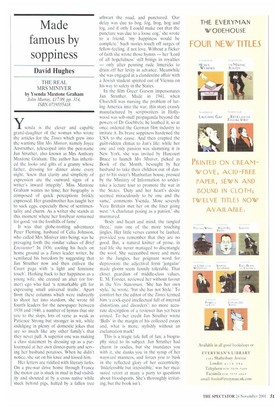Made famous by soppiness
David Hughes
THE REAL MRS MINIVER by Ysenda Maxtone Graham John Murray, £17.99, pp, 314, ISBN 0719555418 Ysenda is the clever and capable grand-daughter of the woman who wrote the articles for the Times which grew into the wartime film Mrs Miniver, namely Joyce Anstruther, telescoped into the pen-name Jan Struther, also known as Mrs Anthony Maxtone Graham. The author has inherited the looks and gifts of a granny whose father, dressing for dinner alone every night, 'knew that clarity and simplicity of expression are the outward signs of a writer's inward integrity'. Miss Maxtone Graham wastes no time; her biography is composed of quick perceptions briskly expressed. Her grandmother has taught her to suck eggs, especially those of sentimentality and charm. As a writer she stands at this moment where her forebear remained for good, on the foothills of fame',
It was that globe-trotting adventurer Peter Fleming, husband of Celia Johnson, who called Mrs Miniver into being; was he presaging forth the similar values of Brief Encounter? In 1936, cooling his heels on home ground as a Times leader writer, he ventilated his boredom by suggesting that Jan Struther now and then enliven the Court page with 'a light and feminine touch'. Harking back to her happiness as a young wife, she created an alter (or former) ego who had 'a remarkable gift for expressing small universal truths'. Apart from these columns which were indirectly to shoot her into stardom, she wrote 60 fourth leaders for the newspaper between 1938 and 1940, a number of hymns that stir you to the slops, lots of verse as weak as Patience Strong but stronger in wit, while indulging in plenty of domestic jokes that are so much like any other family's that they never pall. A superior one was making a class statement by dressing up as a parlourmaid at her own dinner-party and serving her husband potatoes. When he didn't notice, she sat on his knee and kissed him.
Her letters are riddled with literary larks. On a pre-war drive home through France the motor car is stuck in mud in had visibility and shouted at by a cross native while stuck behind pigs, halted by a fallen tree athwart the road, and punctured. 'Our delay was due to bog, fog, frog, hog and log, and if only I could make out that the puncture was due to a loose cog,' she wrote to a friend, 'my happiness would be complete.' Such stories touch off surges of fellow-feeling, if not love. Without a flicker of faith she wrote those hymns — her 'Lord of all hopefulness' still brings in royalties — only after penning rude limericks to drain off her levity in advance. Meanwhile she was engaged in a clandestine affair with a Jewish student spirited out of Vienna on his way to safety in the States.
In the film Greer Garson impersonates Jan Struther. Made in 1941, when Churchill was nursing the problem of luring America into the war, this story crassly manufactured by scriptwriters in Hollywood was sob-stuff propaganda beyond the powers of Dr Goebbels; he loathed it, so at once ordered the German film industry to imitate it. Its brave soppiness hardened the USA to the cause. And then erupted the guilt-ridden climax to Jan's life: while her one and only passion was slumming it in New York, she was invited by Harcourt Brace to launch Mrs Miniver, picked as Book of the Month, besought by her husband to take their children out of danger to his sister's Manhattan house, pressed by the Ministry of Information to undertake a lecture tour to promote the war in the States. 'Duty and her heart's desire seemed miraculously to be one and the same,' comments Ysenda. More severely Vera Brittain met her on the liner going west. 'A charlatan posing as a patriot,' she murmured, 'Body and heart and mind, the tangled three,' runs one of the more touching jingles. Her little verses cannot be faulted, provided you remember that they are no good. But, a natural knitter of prose, in real life she never managed to disentangle the wool. She succumbed more and more to the Jungles, her poignant word for depression; the adjectival form `jungular' made gloom seem funnily tolerable. That closet guardian of middle-class values, E. NI. Forster, reviewed her without favour in the New Statesman. 'She has her own style,. he wrote, 'but she has not Style.' To comfort her the editor of the Times termed him 'a cock-eyed intellectual full of internal distortions and disorders': no more accurate description of a reviewer has yet been coined. To her credit Jan Struther wrote 'Balls' in the margin of his collected essays and, what is more, stylishly without an exclamation mark!
This is a tragic tale full of fun, a biography sized to its subject. Jan Struther had charm in oodles, but she inundates you with it, she dunks you in the syrup of her wayward manners, and forces you to bask in the reflected glory of her eccentricity. 'Indefensible hut irresistible,' was her measured retort at many a party to questions about bloodsports. She's thoroughly irritating, hut the book isn't.


















































































 Previous page
Previous page